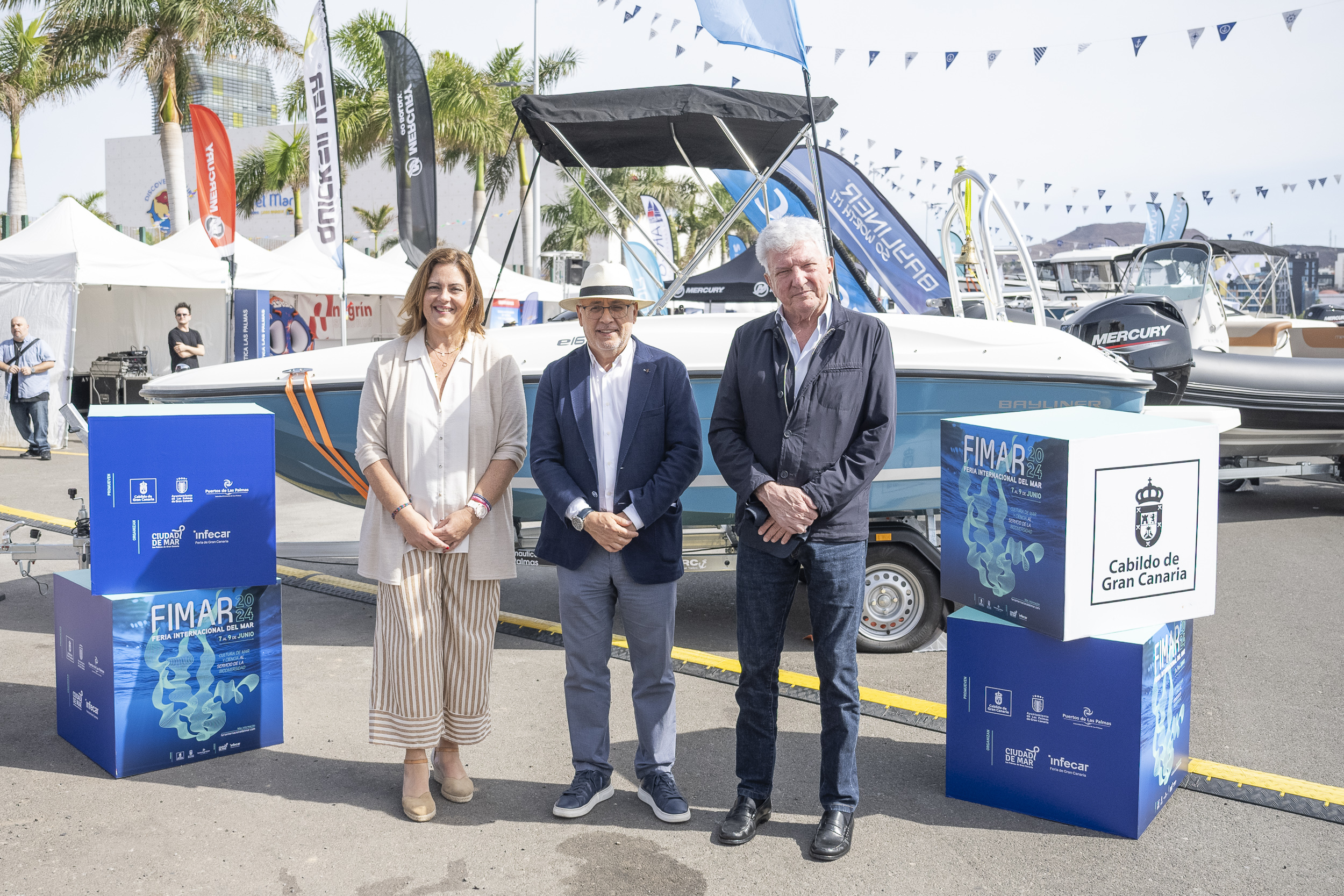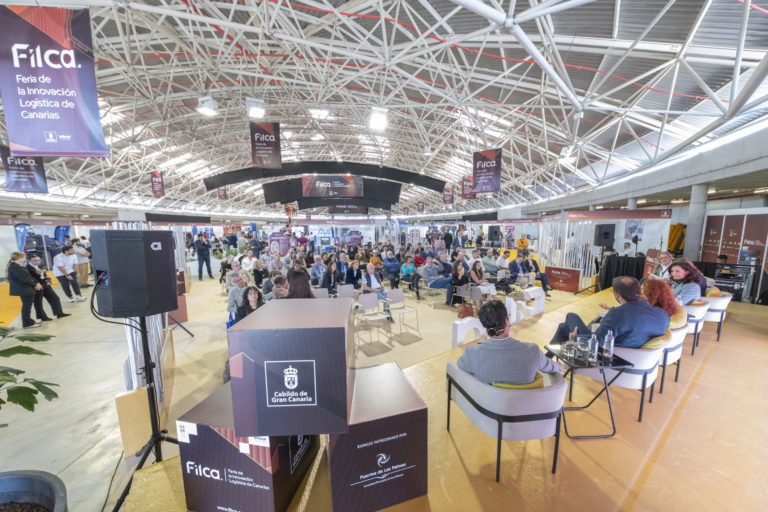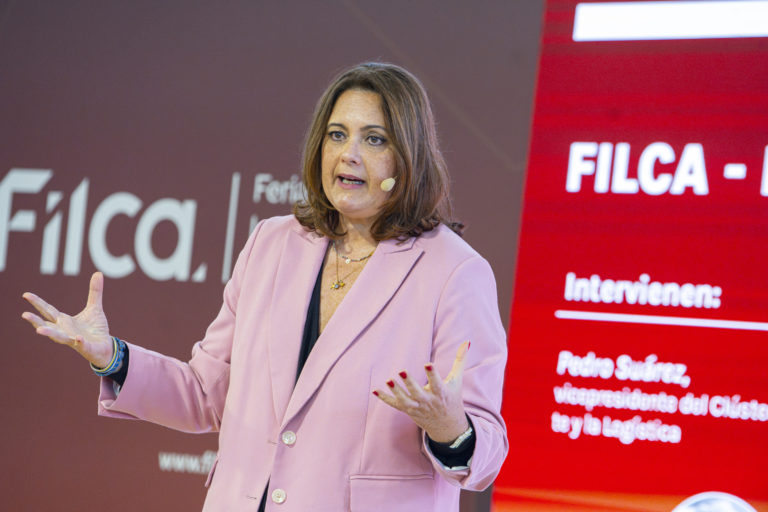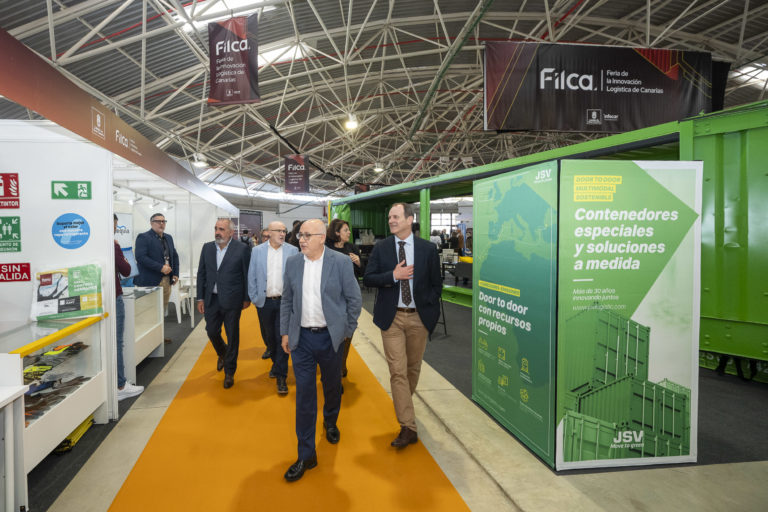- The president of the Cabildo, Antonio Morales, the deputy mayor and City of the Sea councilor, Pedro Quevedo, and the president of the Port Authority, Beatriz Calzada, inaugurated the 13th edition of the International Sea Fair at the Sanapú Pier.
- The event offers various weekend commercial, informative, and leisure activities.
Ian and Nayelis, second-grade students from CEIP Hoya Andrea, rang the small bell on Friday morning that announced the start of FIMAR each year. The 13th edition of the International Sea Fair officially began on June 7th at its new location in Sanapú Pier, marking a significant event for the blue economy in the city and the island. The president of the Cabildo of Gran Canaria, Antonio Morales; the first deputy mayor and councillor for Local Development, Employment, Solidarity, Tourism, Mobility, and City of the Sea of the Las Palmas de Gran Canaria City Council, Pedro Quevedo; and the president of the Port Authority of Las Palmas, Beatriz Calzada, formally inaugurated the fair. The event features over fifty companies, entities, and businesses related to the sea, around 80 stands, and a wide range of informative and leisure activities open to the public.
FIMAR is promoted by the Cabildo of Gran Canaria, the City Council of Las Palmas de Gran Canaria, and the Port Authority of Las Palmas, and organized by the City of the Sea Council of the city and Infecar, Feria de Gran Canaria.
Antonio Morales, president of the Cabildo of Gran Canaria, emphasized “the enormous significance” of the fair, noting that it is made possible by “the combined efforts on the island of Gran Canaria between the Cabildo and the City Council, with decisive participation from the Port Authority of Las Palmas.” Morales highlighted “the fundamental role” that the blue economy should play in diversifying the economy of the Canary Islands and remarked on “the extraordinary and symbolic location for the city” where this 13th edition of FIMAR is held.
He underscored that the fair “brings together a significant part of the various sectors involved in the development of the blue economy on the island,” including nautical sports, research, and science, with strong public engagement. Last year, he added, “Thousands of people came here to purchase nautical products and learn about other elements of the blue economy, becoming familiar with this economic activity that must be crucial in the coming years for the development of Gran Canaria.”
Pedro Quevedo, deputy mayor and councillor for Tourism and City of the Sea of Las Palmas de Gran Canaria, highlighted that “FIMAR has already had 13 editions, which means we are doing what a City of the Sea should,” like Las Palmas de Gran Canaria. Quevedo stated, “We have historically been connected to the sea, not in vain as it surrounds us, but we have not always used the marine environment correctly for economic and social development. FIMAR represents a recovery of that idea, the need to develop the blue economy to use the marine environment for more than just swimming or sailing. And there are many more things to do.” Additionally, the fair has “great appeal,” especially for families, as “from the youngest to the oldest visitors will find topics of interest here.”
Quevedo also noted that this year, the guest city at FIMAR is the Portuguese Viana do Castelo. It has a great port and surfing tradition, a theme they are interested in developing further. He referred to the professional day ‘Blue Impulse,’ held this Thursday, January 6, at the Marine Maritime Innovation Center (CIMM) in the Puerto de Las Palmas Foundation Building, with the Portuguese population as the primary focus. Quevedo asserted, “We have little to envy almost anyone; we are becoming a reference for many people in many places, and we must continue this way.”
Beatriz Calzada, president of the Port Authority of Las Palmas, highlighted the “pleasure and pride” of hosting the fair in their facilities, as “if there is an environment 100% linked to the blue economy, it is this port, which demonstrates this every day with all the companies operating here,” also “with that environmental awareness.” FIMAR, she noted, “is a showcase for all this crucial work for a land like ours because ultimately, we are the sea, and we must claim this in every aspect. This fair is an example of that.”
Calzada emphasized the space where FIMAR 2024 is being held, as it is the axis “of this great Port-city project, with that area we will offer to the citizens, not only of Las Palmas de Gran Canaria but of the whole island,” with that “port identity,” as “a large green space,” and “with a maritime museum that will allow us to learn even more about the pier, and the maritime and fishing activity that has made this port, this city, and this island great.” She highlighted the “international” character of FIMAR, “and the internationalization comes precisely from all the companies participating, even the smallest present here is international because the entire maritime business always operates at that level.”
FIMAR 2024
Since its inauguration, the public has progressively joined FIMAR, visiting facilities with around fifty exhibitors and 80 stands installed. FIMAR 2024 features a wide representation of public and private entities, marine, maritime, and nautical sector companies, and a broad panel of researchers and speakers accessible to the public.
Dissemination
The University of Las Palmas de Gran Canaria contributes to this edition of the International Sea Fair with a wide array of speakers, from the faculties of Marine Sciences or Philology to entities like the Spanish Algae Bank, the University Institute of Aquaculture Research (ECOAQUA), the Institute of Oceanography and Global Change (IOCAG), or the University Institute of Animal Health and Food Safety (IUSA).
Additionally, the Canary Islands Oceanic Platform (PLOCAN) is on a panel that includes RedPROMAR and the Canary Association of Maritime Collectors.
Experts will share their knowledge on topics such as climate change evolution, the “algae revolution,” the status of the Canary Islands as “the ideal laboratory” to evaluate the planet’s climate transformation, the impact of microplastic ingestion on fish, marine biodiversity, or ocean and polar research.
Regarding the public leisure program, the usual boat tours inside the port have been scheduled (on a first-come, first-served basis, without prior registration), at 11:00, 13:00, 15:30, and 17:30 on Friday the 7th and Saturday the 8th; and at 11:00 and 13:00 on Sunday the 9th.
Demonstrations in the port’s water area, family activities, and a children’s area are also offered. The program includes a helicopter rescue demonstration by the Canary Islands Air Command, a gastronomic area, and visits to the Civil Guard vessel.
Sunday, June 9, the last day includes a parade at 12:00 and a concert by Los Coquillos at 13:00.



